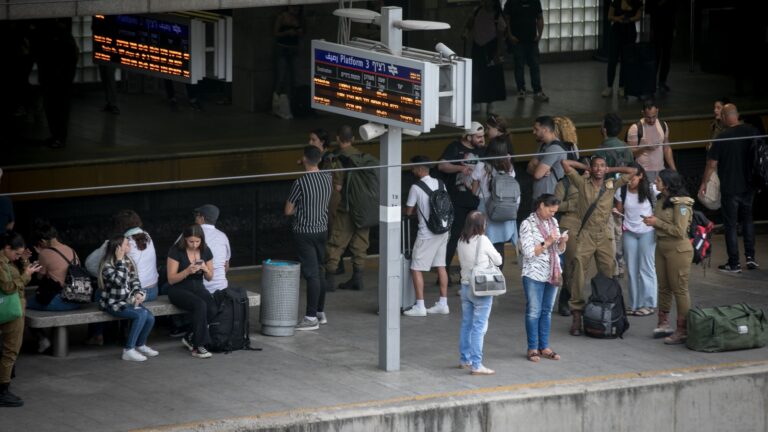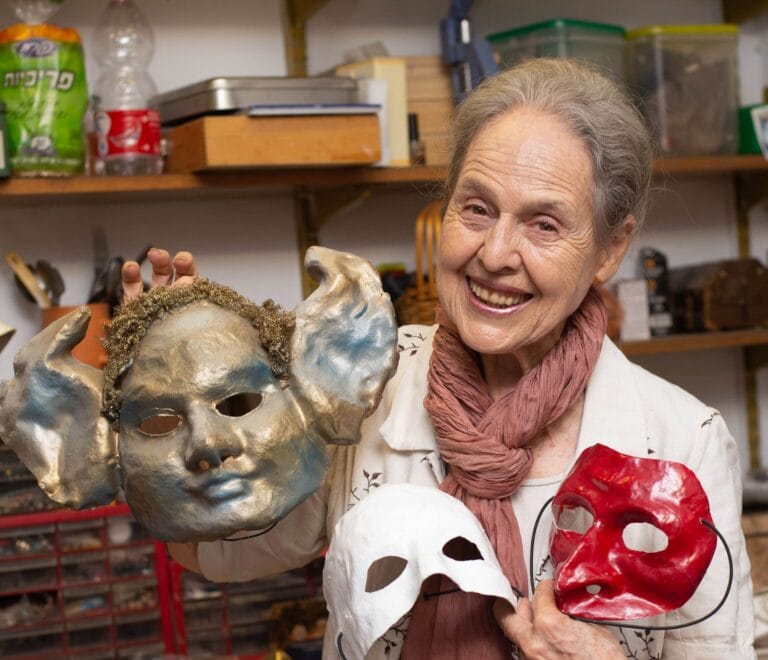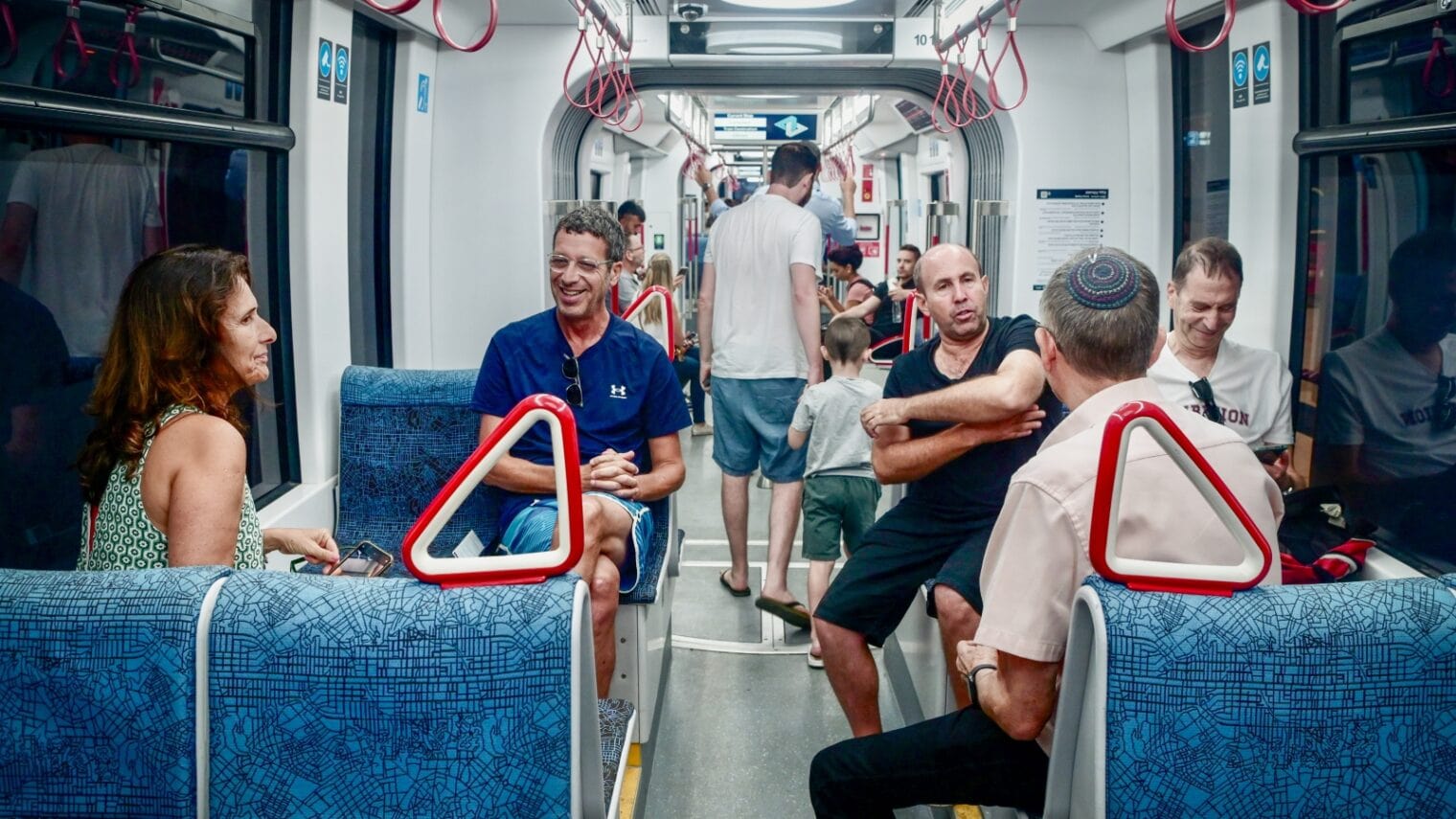In a country at war, trains and buses not only keep rolling along, but are preferred by many commuters. I guess that’s because when incoming rockets or terror attacks are a real threat, there’s safety in numbers and larger vehicles.
For me, public transportation isn’t just a temporary wartime choice. Before moving to Israel from New Jersey 16 years ago, my husband and I sold our two Subarus and declared ourselves car-free.
Yes, public transportation can be inconvenient, unreliable and crowded. When we’re going somewhere remote or we’re toting baggage, we have to rent a car, call a cab or hitch a ride with friends.
But avoiding car ownership has saved us considerable money, spared us the twin nightmares of parking and traffic jams, and lowered our carbon footprint substantially.
And there’s an unexpected side benefit: Meeting people we’d never have met in the solitary bubble of a car.
Talking to strangers
I don’t usually converse with strangers on a bus or train. When I do, it’s always an enriching experience and helps me practice my Hebrew.
Less than a week before the war started, this is how I met Francoise.
I had just boarded a 7pm train after visiting our daughter’s family in the Haifa district. I would be transferring to a different train in Tel Aviv at 7:30 and then catching a bus home from Jerusalem at 8:30.
When I overheard my seatmates discussing how to get to Jerusalem, I told them that I could help.
“Thank you, but we’re not going until tomorrow,” one replied. Then she nodded toward a woman with a gray bun across the aisle. “Perhaps she could use your help getting to Jerusalem tonight.”
The woman smiled sweetly when I offered assistance.
With the hint of a French accent, she explained that she was coming from the annual Acco Theater Festival. Although she’s lived in the Jerusalem area for 60-plus years, she had never traveled so far north on the train and was not certain which station was the best transfer point.

“No problem, just follow me,” I assured her.
At 7:28, I beckoned her to disembark with me at the Tel Aviv University stop. At 7:31, the train to Navon Station in Jerusalem chugged onto the same track.
Facebook friends
That would have been the end of the story, had she not chosen to sit in a seat facing mine. Though the novel I’d brought along for the ride remained in my backpack, getting acquainted with a stranger was far better than fiction.
We introduced ourselves and chatted about where we came from originally (she’s from Paris), where we live now, and how many children and grandchildren we have.
She told me she’d sailed to Haifa in the 1960s from Marseilles, and has remained enchanted with Israel ever since.
When I admired the patterned wool cape spread across her lap on the chilly train, her angelic smile widened. “Oh, I bought that wool many years ago,” she said, fingering the heavy fabric.
“You’re a seamstress?” I asked.
“I was actually a costume designer for theater,” she replied. “You can look me up on Facebook.”
I whipped out my phone and opened Facebook. She typed in her name, Francoise Coriat.

I saw that we had a friend in common: my relative Betty Klein, a Jerusalem-based international folksinger and instrumentalist.
“I once sang with Betty,” Francoise told me. “Send her my regards!” I immediately texted Betty on Messenger, who promptly replied, “Wow! Warm regards to Francoise.”
Still smiling
Later I googled Francoise and discovered she is also a set, prop and mask designer. She studied art history and literature at the Sorbonne. She draws, sculpts and sings.
Her marionettes, masks, hats, costume jewelry and painted backdrops have been featured in productions of the Jerusalem Khan Theater, Jerusalem Opera, Jerusalem Academy of Music and Dance, Nissan Nativ Studio and small “fringe” groups.
She taught in the theater studies department of Hebrew University from 1999 until 2020, and maintains a studio there to help with student productions. She’s held many solo art exhibitions and wrote books including one in English, Retrospective: Forty-Two Years Behind the Stage.
She showed me a delightful picture of herself dancing with a young granddaughter and a marionette in the Wohl Rose Garden in Jerusalem.
As we rolled into Navon Station, Francoise and I exchanged business cards and a warm handshake. And off we went into the night, each to a different bus stop for the final leg of our journey home.
Unfortunately, my bus arrived a bit late and was packed with loud teenagers. I could barely move, let alone sit down. But thanks to my random encounter with Francoise, I was still smiling when I got home at 9:15.
















